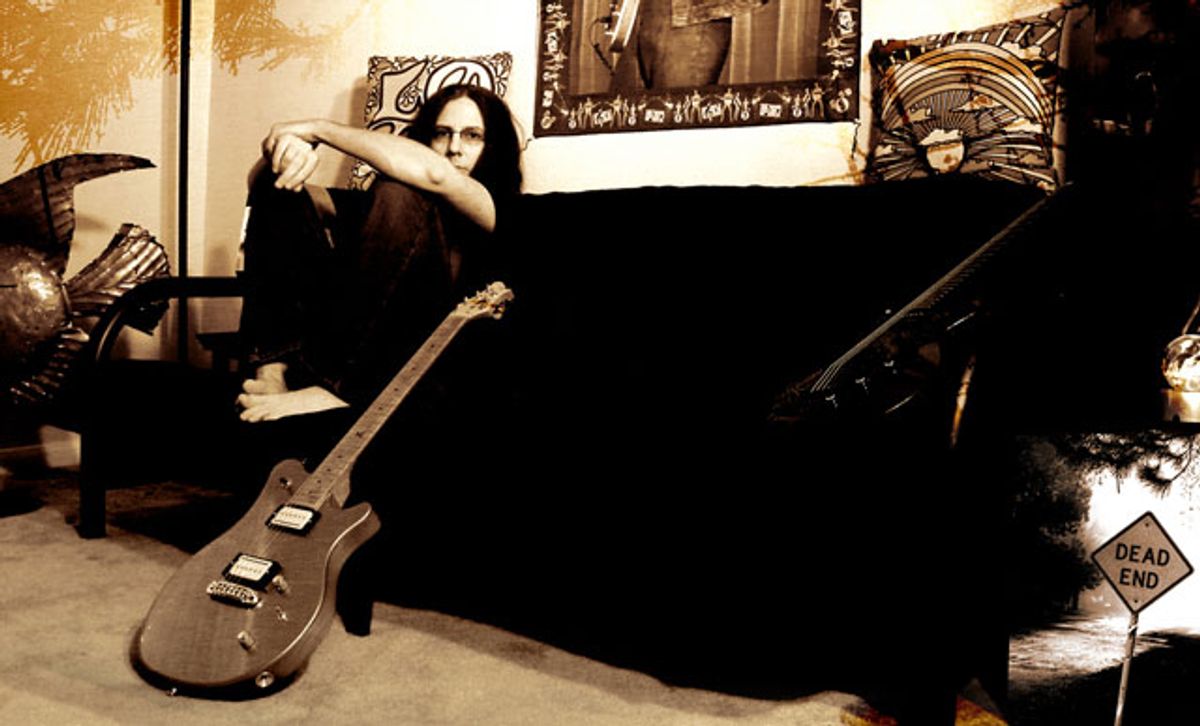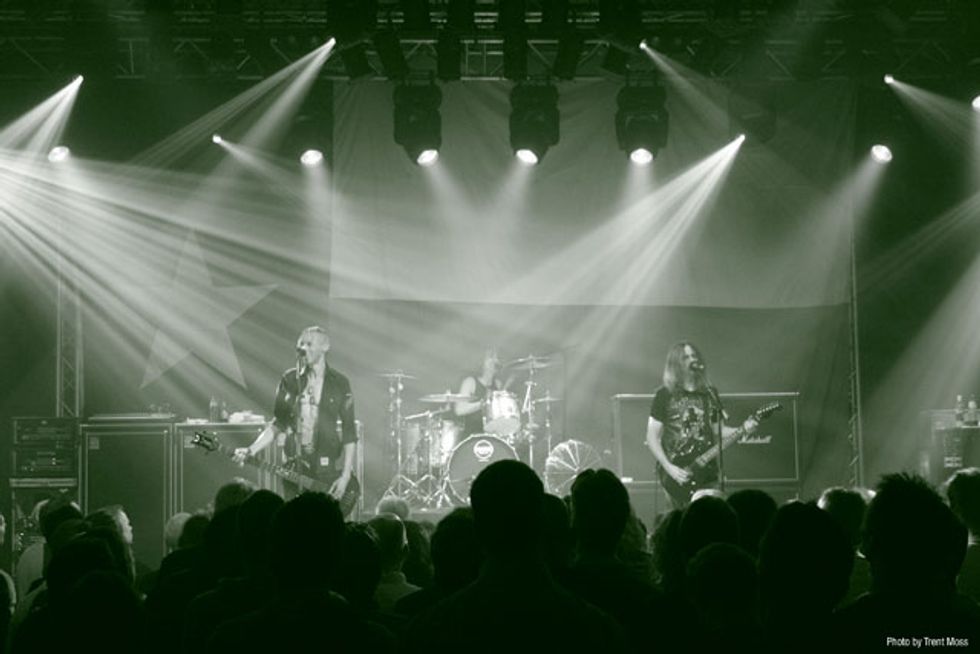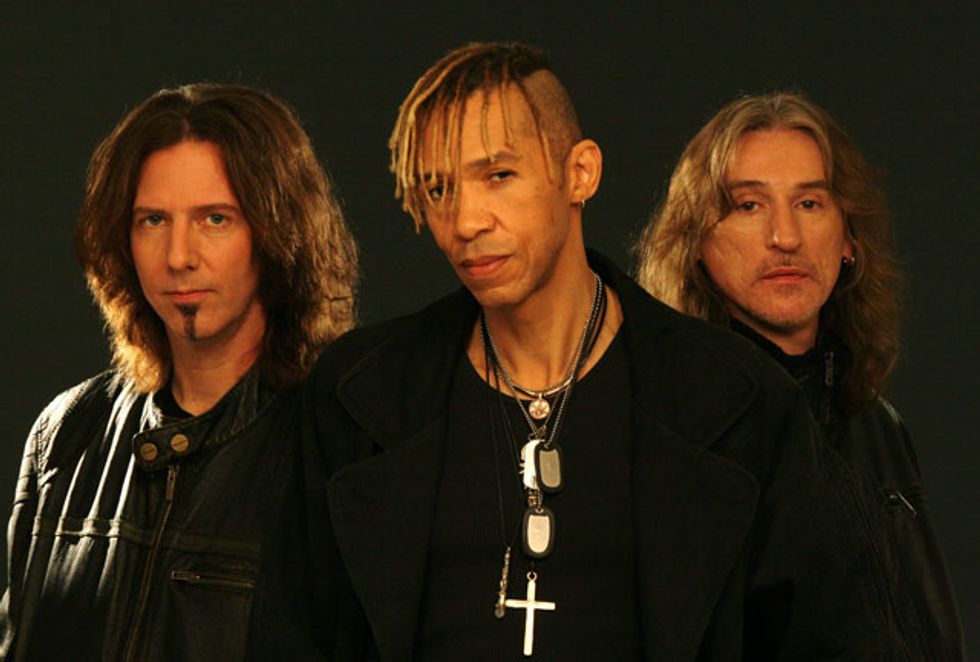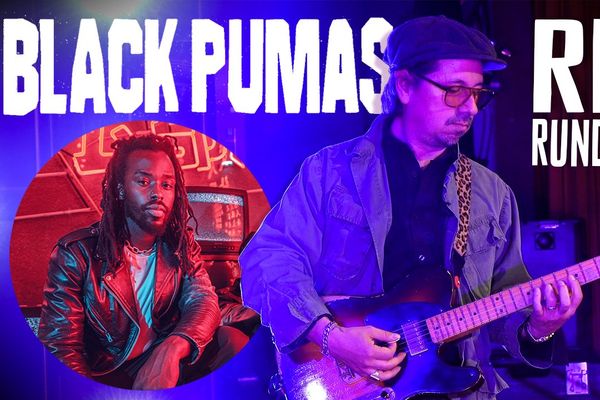
Ty discusses his iconic guitar tone, current plans for a new King''s X album, his home studio, and his plethora of side projects
What's your current live rig?
My current live rig is the simplest I've ever had before. It's the first time since the very early days when I first started playing in bands that I've used floor pedal effects for my delay. I've been using rack effects for years because I think they sound better, but I found a combination of things on this last tour on accident that turned out to work really well. We were rehearsing for the tour and I was having problems with my regular full rig so for the sake of not ending a practice, I plugged into a Fractal Audio Systems Axe-FX Ultra and we rehearsed with that one that day. The next day I came in with my regular rig when it was fixed and plugged it in, and none of us thought it sounded as good as the Ultra. So I went on tour with this really simple rig—the Ultra as the preamp running into a Randall RT2/50 power amp. Then on the floor I have a delay pedal [Line 6 DL4] and a Seymour Duncan Pickup Booster, which I use for playing leads, and that's it. I just started using this rig on the tour we did this summer co-headlining with Accept—it was a blast.
Do think you're going to stick with this rig, then?
I think I'm going to stick with it because it made me play differently. I didn't have as much to lean on as far as effects and sounds. I couldn't use that stuff as a cover, which in the past may have made me lazy. In this rig, every little note and everything you play is heard very clearly so it forces you to play differently. I found myself thinking more about vocal melodies on leads. I had to make the sounds I wanted with my fingers instead of using machines, and I think it pushed me to a different spot in my playing. It was a real positive experience. When I listen back to anything played from that rig, I can tell that I was approaching my playing in a different way and I really enjoyed doing that—it was fun.
Do you use the same rig with King's X as you do in your other projects?
I use that rig on pretty much everything I do, but I will sometimes use other things in addition to it depending on what I'm working on. Right now we're working on a brand new Jelly Jam album. And although I did use my rig for some of the basic tracking, I'm also using a Lab Series [L5] like I used on some of the early King's X stuff in addition to my regular rig and I'm combining the two on this album. The Lab Series has some great effects that take the sound to another level.
Is the versatility of a guitar rig as important as the perfect tone? Do you need to compromise one to get the other?
I think that you do need to make that compromise in a lot of cases. There are a lot of amps that don't give you a lot of options other than what they do best. I've definitely had some very one-dimensional amps, but they were so good at what they did that it wasn't necessarily a bad thing. On the other end there are a lot of rigs out there that allow you to have a plethora of tones, especially these amp modeling rigs. But the majority of them, I'll be honest, I don't really care for the way they sound—I'm mostly into stuff with real tubes. I have to say that the Axe FX Ultra is the first modeler that I've used that I thought was pretty good. There are just so many different options and ways to tweak the tone. You can tweak it until it sounds like the real deal. That, for me, is the best option for versatility and tone. But not everyone can go out and buy one because they're not real cheap. For some people, just one particular amp that does exactly what they want it to do works great. Usually those amps that do only one thing will kick ass at that one thing, which makes up for it.
Your preamps have some modifications. What have you had done to get the tones you want?
The preamp sections are tweaked for me by the people at Egnater. One of the modules I have is something that they don't sell. I have two of them. We call it the Gretchen Module because it was designed to emulate the Lab Series L5 as best as possible, and they did a really good job at getting very close on that. So, I have a couple of those and then I have a couple of Egnater EG5 preamps with a mid-boost added to them for me. Then those run into my power amp.
The cool thing with my power amp, the Randall RT2/50, is that you can mod it out yourself. They have bias channel adjustments for both sides of the tubes. I've got 6L6 tubes in one side and EL34 tubes in the other side. So when you play it out of two cabinets, they each sound a little bit different and it helps to spread the sound and gives you a wider guitar tone. And because I have two different tubes on different channels, this amp gives you the ability, with the bias adjustment, to run the tubes on either side of your amp hotter or colder. You can develop your own sound yourself. On any other amp you would have to bring it into a shop and pay somebody to do that for you, and it costs a lot of money. This is the only amp I've ever seen that has an adjustment in the front of the amp that you can adjust with a screwdriver. It gives you total control because you can run the tubes cool if you want a nice clean tone and if you want to saturate and get ugly, you can hit those tubes hard. You can even go colder on one side and crank them up on the other side. I've never seen that kind of versatility before.

What's new for King's X? You just released a DVD this fall. Are there plans to record a new studio album anytime soon?
I'm sure there will be a new studio album on the way sometime next year but at the moment we're not really worried about it. Doug just recently moved, and I'll be moving here shortly if all goes well. So we're taking a little bit of time off with that happening. But we're supposed to tour Europe in April [Editor's note - the tour was not confirmed at the time of the interview, but is now confirmed for seven countries]. We'll be touring to promote the DVD for a little while and once we're done with that, we'll get back and start putting together a new album.
Do you feel like your role in King's X has changed over the years?
I think that all of us in the band have gone in and out of roles over time as the band has evolved. Over the years we've been able to discover our strong points and our weak points and develop our roles to best fit the band. Right now, I've evolved myself out of the decision making side of things as best as possible. I'm trying to get myself away from having to deal with the little details and only have to worry about the music. I used to be the person who worked out all of the details of our shows and the way things are put together, but I've intentionally backed out of that role as far as I can. I've just been enjoying playing music more since backing out of that role.
Certainly your time spent working on side projects has proven that you truly enjoy making music.
King's X has a lot of time off and I like to keep playing and recording. Having my own home studio now has given me that option. Whenever I feel inspiration I have a place where I can go and record it. That's a really amazing situation to have and I'm very thankful for that.
Could you tell us how that studio came to reality and the role that's played in your side projects?
I first started the studio to record my first solo album, which was recorded back in the '90s. It was called Naomi's Solar Pumpkin and it wasn't even distributed worldwide, it was only sold online. It was my first attempt at a solo album, and it sold so well that I was able to sink that money from that album into the studio and started getting more gear. So it all started with that first solo album and that first record got me a deal with Metal Blade where I released my second solo album, Moonflower Lane. I actually re-recorded some of the songs from the first album along with a few new ones for the second record.
Then after the solo record deal happened, I started looking for other uses for the studio because I knew I would only be doing a solo album every couple years. At that same time I was contacted by John Myung [of Dream Theater] and I was really interested in doing some music with him, Rod Morgenstein [Winger], and Derek Sherinian [Planet X]. We weren't sure what kind of music it was going to be but we all knew we were going to do something different than what we normally do—that was the beginning of the Platypus and The Jelly Jam projects. The studio made those things possible because there weren't big budgets involved in these side projects at first. So to have a place to do all the recording and mixing without it being on the dime opened the gate up to new things and I started doing side projects. I did those two Platypus albums, Jelly Jam albums, a Jughead album, more solo albums, other local people's albums, plus I was mastering albums for people all over the world. It just blew up into a full-time job when I'm off the road and now I pretty much live in the studio. It started out as something just to record solo albums on and evolved into something that takes up every spare second of my life.
Do you use digital or analog recording equipment?
I use a computer for laying the actual tracks down now, I was using tape for a long time. It's all digital now but with some really good analog front-end gear going into the digital gear. I've got a couple key pieces of gear that I'm super proud of. Recently I got something from Demeter called a VTMP-2b, which is a really classic tube microphone preamp. John Myung purchased two of those, one for me and one for him, just for working on the new Jelly Jam album. And they don't make them anymore, so he had two of them specially made for us. So, I've got a brand new one of those and it sounds amazing! I've got a few choice little things like that which are really nice to have. So I use a combination of digital and analog gear that seems to be working pretty well.

How's the new Jelly Jam album coming along?
I'm just working on the new Jelly Jam album right now, it's called Shall We Decsend? and it should be out in early 2011 on Molken Music. All of the recording is done, I'm just working on the mixing and mastering now. We've been working on it off and on for a while now, we started the whole process early this year.
You produce all of your solo albums yourself, would you ever consider working with a producer?
When it comes to solo stuff if I feel like using a producer I'll do it, but for now I feel like I only want to do solo music if it's truly just me doing what I want to do. I feel like the only way I can do that is to produce it by myself. I've tried working with producers and it usually ends up with me doing what they like and there being elements in the music that I don't identify with. That had bothered me in the past, so now I do it completely by myself.
Do you ever find it difficult to see your music through the eyes of a producer. Is there ever an internal struggle between what will be marketable and what you really want to do?
I think it's always [difficult] to look critically at anything dealing with yourself. It's always easier to look at anything else and see what is obviously lacking. But when it comes to yourself, because you live with these ideas that are developing every day, you're so close to it that it's impossible to hear it for the first time like someone who might have just bought the album. It's always difficult to have good perspective when you're doing things yourself. So I have two main people that I pass everything through and ask for their honest opinion, and they are brutally honest. One is my girlfriend, she's got a really good ear, she gets what I'm trying to do, and she can immediately point to something and I will immediately know she's right and that somewhere down deep I did feel that way about that part. But when you have so many aspects to a song, sometimes you let things go. Thank goodness I've got her and my buddy Wally Farkas down at Molken Music, he gives me brutal honesty also. Having those kinds of people to tell me where I'm being lazy or maybe I could rework something, that's really a blessing for me.
At what point did you realize that you loved music and that you wanted to pursue it professionally?
I've just always known since as early as I can remember that was what I wanted to do. It's largely because of being exposed to music as a baby and being exposed to the Beatles when they first hit. I heard “I Want to Hold Your Hand” when I was very young and I used to bug people to play Beatles music all the time—I just couldn't get enough of that music. I would run around the house air-guitaring. My dad played guitar, so I was always around guitars. So just being surrounded with all of that at such an early age, I just always had known that was what I wanted to do.
Do you have any advice to blooming guitarists out there?
This is going to be over simplified, but it's probably the truth: just enjoy what you're doing. If you're going to play music, then play what you want to play and play what makes you happy. Enjoy what you're doing, because if you do enjoy it you'll find that you can work hard at it and it doesn't seem like work. That's the key. You'll have to put in more hours sometimes than people who have 9-5 jobs if you're a serious musician, but if you love it, it doesn't feel like work anymore. When I get up in the morning and I have something to work on in the studio that I'm excited about, its just such a wonderful feeling to know that it's actually my job. So, do what you want to do. It might not be what everyone else wants you to do, but you're the only person who can control what you do.
Is there anything else you'd like to add?
I just want throw out a big “Thank You” to all of our fans. We just had a very successful tour here this year promoting the new DVD. It's always so great to see everyone coming out to the shows and supporting us. And as long as that keeps happening, hopefully we can come back and play often. So a huge thank you goes out to all of our fans.
Ty Tabor's Gear Box
Guitars
Guilford Ty Tabor Model Guitars (With Seymour Duncan P-Rails)
Custom guitar designed by Frank LaMara and built by Gene Baker with custom-wound Motor City Pickups pickups.
Amps
Randall RT2/50 Power Amp (equipped with 6L6 tubes on one side and EL34 tubes on the other)
Gretchen Module (Lab Series L5 copy) preamp
Egnater EG5 Preamp (With Mid-Boost Mod)
Egnater Cabinets
Randall 4x12 Cabinets (with Celestion Vintage 30 speakers)
Effects
Fractal Axe-FX Ultra
Seymour Duncan Pickup Booster Pedal
Line 6 DL4
Accessories
Strings: DR Hi Beams - (.009 -.042 for standard tuning and .011 - .052 for Drop D tuning)
Cables: G&H Lava Cables
Picks: Thin plastic/rubber composite designed by Mel Day.
